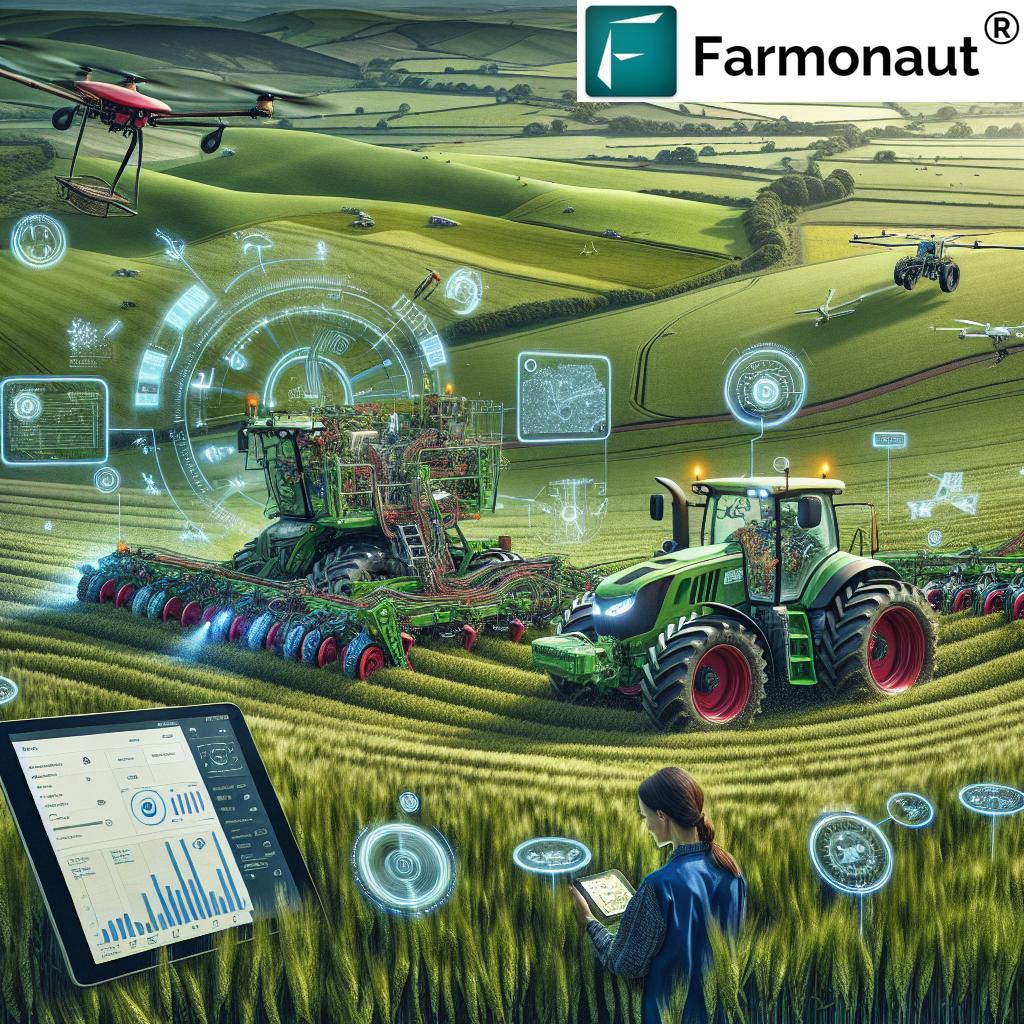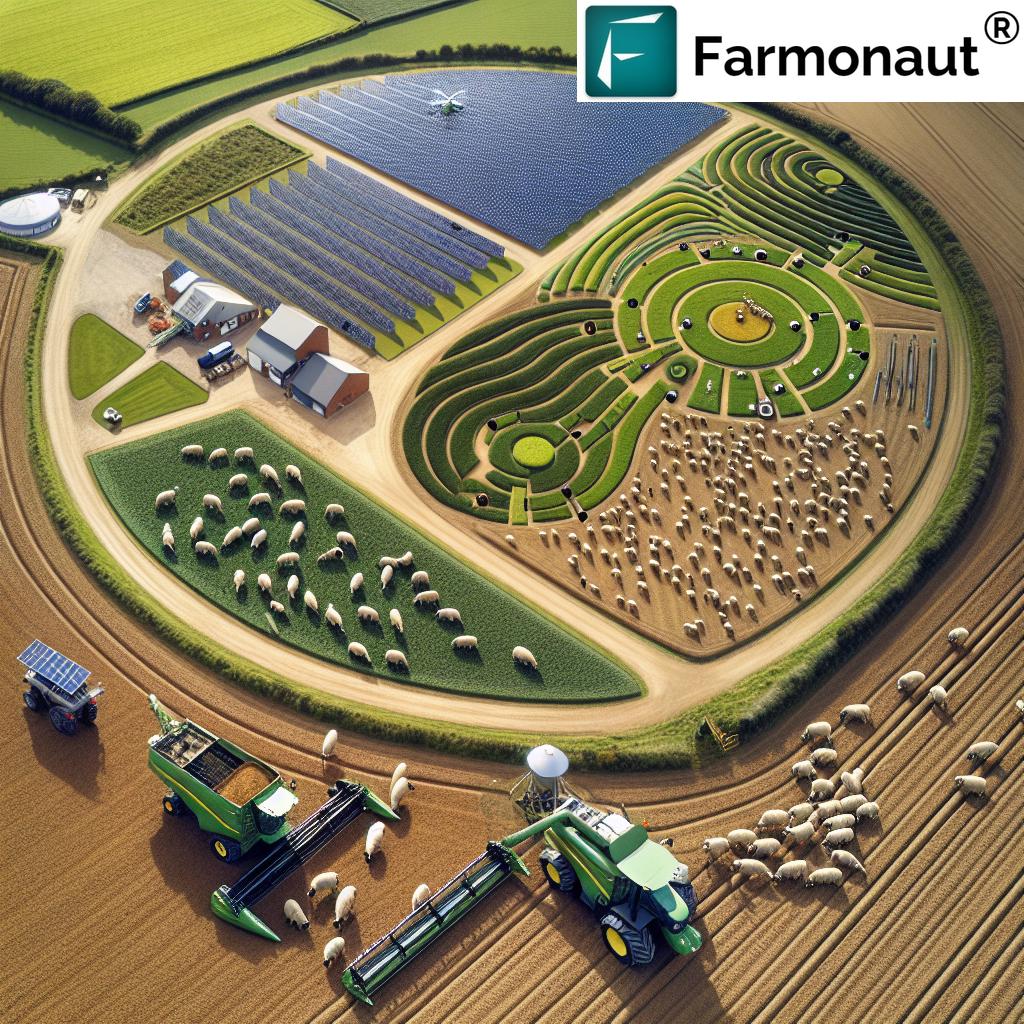Revolutionizing Agriculture in England: Precision Farming Technologies Transforming Crop Monitoring and Farm Management
“Precision farming technologies have increased crop yields by up to 15% in some regions of England.”
Welcome to our comprehensive exploration of how precision agriculture technology is revolutionizing farming practices across England, Scotland, and Wales. In this blog post, we’ll delve into the cutting-edge smart farming solutions that are transforming both the agricultural and livestock industries. From advanced crop monitoring systems to innovative farm management software, we’ll examine the tools that are helping farmers optimize their operations and embrace the future of agriculture.

The Rise of Precision Agriculture in the UK
Precision agriculture technology has been gaining significant traction across the United Kingdom, with farmers in England, Scotland, and Wales increasingly adopting these innovative solutions. This shift is driven by the need for more efficient and sustainable farming practices in the face of growing environmental challenges and economic pressures.
Some key areas where precision agriculture is making a significant impact include:
- Crop monitoring and management
- Soil health improvement
- Resource optimization
- Livestock tracking and management
- Farm data analytics
Let’s explore each of these areas in more detail and see how they’re transforming the agricultural landscape across the UK.
Advanced Crop Monitoring Systems
One of the most significant advancements in precision agriculture has been the development of sophisticated crop monitoring systems. These technologies allow farmers to keep a close eye on their crops’ health and development, enabling them to make data-driven decisions about irrigation, fertilization, and pest control.
Farmonaut, a leading agricultural technology company, offers satellite-based crop health monitoring services that provide farmers with valuable insights into their fields. By leveraging multispectral satellite imagery, Farmonaut’s platform allows farmers to track vegetation health (NDVI), soil moisture levels, and other critical metrics. This data helps farmers make informed decisions about resource allocation and crop management strategies.
Soil Health Monitoring and Management
Maintaining optimal soil health is crucial for sustainable agriculture, and precision farming technologies are making it easier than ever for farmers to monitor and manage their soil conditions. IoT sensors and advanced analytics tools allow farmers to track soil moisture, nutrient levels, and pH balance in real-time, enabling them to make precise adjustments to their farming practices.
Farmonaut’s platform integrates soil health monitoring capabilities, providing farmers with actionable insights to improve their soil management strategies. By leveraging this technology, farmers can optimize their use of fertilizers and water, reducing waste and environmental impact while boosting crop yields.
Agricultural Drone Applications
Unmanned aerial vehicles (UAVs), or drones, have become increasingly popular in agriculture, offering farmers a bird’s-eye view of their fields and providing valuable data for decision-making. In England, Scotland, and Wales, farmers are using drones for various applications, including:
- Crop health assessment
- Precision spraying of pesticides and fertilizers
- Field mapping and surveying
- Livestock monitoring
These agricultural drone applications are helping farmers save time and resources while improving the accuracy of their field assessments and treatments.
Farm Management Software
Modern farm management software is revolutionizing how farmers across the UK organize and analyze their operations. These comprehensive platforms integrate data from various sources, including weather stations, soil sensors, and machinery, to provide a holistic view of the farm’s performance.
Farmonaut’s farm management software offers a range of features designed to help farmers streamline their operations and make data-driven decisions. From crop planning and inventory management to financial tracking and reporting, these tools are empowering farmers to run their businesses more efficiently and profitably.
Livestock Tracking Solutions
Precision agriculture technologies aren’t limited to crop farming; they’re also transforming livestock management across England, Scotland, and Wales. Advanced tracking systems using GPS and RFID technology allow farmers to monitor the location, health, and behavior of their animals in real-time.
These livestock tracking solutions offer numerous benefits, including:
- Improved animal welfare through early detection of health issues
- Enhanced grazing management
- Theft prevention
- Streamlined record-keeping for regulatory compliance
By adopting these technologies, livestock farmers can improve the efficiency and sustainability of their operations while ensuring the well-being of their animals.

Agricultural Machinery Innovations
The development of smart, connected agricultural machinery is playing a crucial role in the precision farming revolution. From GPS-guided tractors to autonomous harvesting equipment, these innovations are helping farmers in England, Scotland, and Wales improve their efficiency and reduce their environmental impact.
Key advancements in agricultural machinery include:
- Variable-rate technology for precise application of inputs
- Auto-steering systems for improved accuracy and reduced operator fatigue
- Telematics for real-time monitoring and optimization of equipment performance
- Smart implements that can adjust their operation based on field conditions
These machinery innovations are particularly beneficial for large arable farms, where precision and efficiency are crucial for maintaining profitability.
“Over 60% of large-scale farms in the UK now utilize advanced farm management software for improved efficiency.”
Sustainable Farming Practices
Precision agriculture technologies are enabling farmers across the UK to adopt more sustainable farming practices. By optimizing resource use and minimizing waste, these technologies help reduce the environmental impact of agriculture while maintaining or even improving productivity.
Some key sustainable farming practices enabled by precision agriculture include:
- Precision irrigation to conserve water
- Targeted application of fertilizers and pesticides to reduce chemical use
- Conservation tillage techniques to improve soil health
- Crop rotation and diversification strategies based on data-driven insights
Farmonaut’s platform supports these sustainable practices by providing farmers with the data and insights they need to make environmentally conscious decisions.
Farm Data Analytics
The power of big data and advanced analytics is transforming how farmers in England, Scotland, and Wales make decisions. By collecting and analyzing vast amounts of data from various sources, farmers can gain valuable insights into their operations and make more informed choices.
Farmonaut’s farm data analytics capabilities allow farmers to:
- Identify trends and patterns in crop performance
- Forecast yields and plan harvests more accurately
- Optimize resource allocation based on historical and real-time data
- Conduct risk assessments and make data-driven management decisions
These analytics tools are particularly valuable for large agricultural enterprises and cooperatives, enabling them to manage complex operations more effectively.
Precision Agriculture Technologies Comparison
| Technology Type | Primary Application | Key Benefits | Adoption Rate in England (Estimated %) |
|---|---|---|---|
| Agricultural Drones | Crop monitoring, spraying | Precise application, time-saving | 25% |
| GPS-guided Machinery | Field operations | Improved accuracy, reduced overlap | 45% |
| IoT Sensors | Soil and crop monitoring | Real-time data, resource optimization | 30% |
| Farm Management Software | Data integration, analysis | Improved decision-making, efficiency | 60% |
| Satellite Imagery | Large-scale crop monitoring | Wide coverage, frequent updates | 40% |
The Impact on Small-Scale and Organic Farms
While precision agriculture technologies are often associated with large-scale farming operations, they’re also having a significant impact on small-scale and organic farms across England, Scotland, and Wales. These technologies are helping smaller farms improve their efficiency and competitiveness in the market.
Benefits for small-scale and organic farms include:
- Improved resource management, leading to cost savings
- Enhanced ability to meet organic certification requirements through precise record-keeping
- Better pest and disease management through early detection and targeted interventions
- Increased market access through improved product quality and traceability
Farmonaut’s affordable and scalable solutions make precision agriculture accessible to farms of all sizes, helping to level the playing field in the agricultural industry.
Challenges and Future Developments
While precision agriculture technologies offer numerous benefits, their adoption in England, Scotland, and Wales is not without challenges. Some of the key obstacles include:
- Initial investment costs for equipment and software
- The need for digital literacy and training among farmers
- Concerns about data privacy and security
- Ensuring reliable connectivity in rural areas
Despite these challenges, the future of precision agriculture in the UK looks promising. Ongoing research and development are focused on addressing these issues and further improving the capabilities of precision farming technologies.
Some exciting future developments to watch for include:
- Integration of artificial intelligence and machine learning for more advanced predictive analytics
- Development of more affordable and user-friendly precision farming tools
- Increased use of robotics in agricultural operations
- Advancements in remote sensing technologies for even more accurate crop and soil monitoring
As these technologies continue to evolve, we can expect to see even greater adoption of precision agriculture practices across England, Scotland, and Wales, leading to a more efficient, sustainable, and productive agricultural sector.
Conclusion
The adoption of precision agriculture technologies is transforming farming practices across England, Scotland, and Wales. From advanced crop monitoring systems and agricultural drone applications to innovative farm management software and livestock tracking solutions, these technologies are helping farmers optimize their operations, improve sustainability, and boost productivity.
As we’ve explored in this blog post, companies like Farmonaut are at the forefront of this agricultural revolution, providing farmers with accessible and powerful tools to embrace precision farming practices. By leveraging satellite imagery, AI-driven insights, and data analytics, Farmonaut is empowering farmers of all scales to make more informed decisions and improve their farm management strategies.
As the agricultural industry continues to evolve, it’s clear that precision farming technologies will play an increasingly important role in shaping the future of agriculture in the UK. By staying informed about these innovations and considering how they can be applied to their own operations, farmers across England, Scotland, and Wales can position themselves for success in an increasingly competitive and technologically advanced agricultural landscape.
Explore Farmonaut’s API for advanced agricultural data integration
Access Farmonaut’s API Developer Documentation
FAQs
- What is precision agriculture?
Precision agriculture is an approach to farm management that uses information technology and specialized equipment to optimize crop yields and reduce waste by tailoring inputs like water, fertilizer, and pesticides to specific areas of a field. - How does satellite imagery benefit farmers?
Satellite imagery provides farmers with a bird’s-eye view of their fields, allowing them to monitor crop health, detect issues early, and make informed decisions about resource allocation and management strategies. - Are precision agriculture technologies affordable for small farms?
While some technologies can be costly, many solutions, like Farmonaut’s platform, are designed to be affordable and scalable, making precision agriculture accessible to farms of all sizes. - How does precision agriculture contribute to sustainability?
Precision agriculture helps reduce waste by optimizing the use of resources like water and chemicals. It also promotes practices that improve soil health and reduce environmental impact. - What role does AI play in precision agriculture?
AI is used in precision agriculture for tasks such as analyzing satellite imagery, predicting crop yields, detecting pests and diseases, and providing personalized recommendations to farmers.






